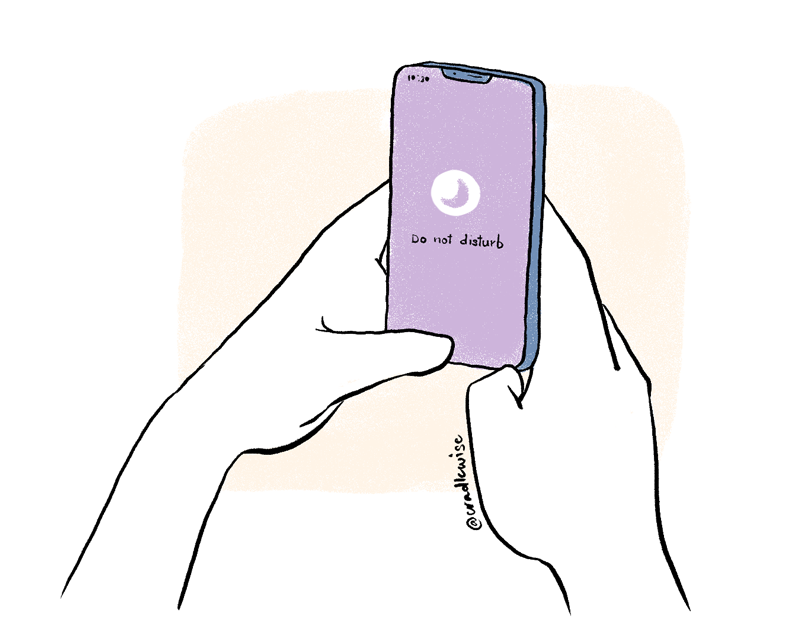New parents are often so consumed with their baby’s sleep that they completely neglect their own. But the same rules apply for babies as they do for grownups: a well-rested person is a happier, healthier person. And just because your sleep might not be the quantity it once was — ah, the joy of eight-plus hours of uninterrupted REM cycles!—there’s plenty you can do to boost the quality of those zzzs.
Because you don’t have time for a 90-minute mindful meditation session every night, we’ve rounded up an assortment of sleep-centered “micro-habits” that are quick, easy, and achievable. And because they aren’t time-consuming tasks, if they give you even five extra minutes in bed, they’ll be well worth adding into your routine.
Jot down tomorrow’s to-do list
Anyone who has tossed and turned for hours because their brain was whirring over all the things they have to worry about the next day might benefit from keeping a notepad and pen on their bedside table. Simply writing down a few concerns, or a complete to-do list of tasks, can help you mentally set them aside until the next morning.
Go outside
Natural sunlight exposure improves daytime energy as well as nighttime sleep quality and duration. This may seem obvious, but with the global transition to remote work — not to mention the vampire-like lifestyle tendencies that come with new parenthood — people are often not getting enough bright light during the day. If sunlight isn’t practical, consider investing in an artificial bright light device for your home.
Limit liquids before bed
One of the keys to healthy sleep is staying asleep. And although hydration is vital for your health, if you’re the type to wake up multiple times each night with the need to urinate, it’s time to limit liquids, at least during the one- to two-hour window before bedtime.
Create a pre-bedtime playlist

Listening to music has been found to help with sleep. Although classical music, in particular, saw positive results in several sleep studies, any playlist of music that relaxes you and lessens your stress can yield benefits for your sleep quality.
Go pee right before bed
This should be the last thing you do before going to sleep to help offset a middle-of-the-night wake-up.
Upgrade your mattress
Ever wonder why you sleep better in a nice hotel? One key reason is likely the bed quality. After just one month with a new mattress, a study revealed a reduction in back pain and stiffness by nearly 60 percent. Of course, the ideal mattress is subjective, but if you are sleeping on one that’s more than eight years old, a quick (albeit expensive) fix for ongoing sleep issues might come with a replacement.
Spritz some lavender oil
Essential oils work their magic with stress management, and lavender is a go-to for sleep time. In fact, intensive care patients have used it as an alternative to sleep medication. Try spritzing a little on your pillow, or if you have skin sensitivities, place some in a diffuser in your room.
Set your phone at the other end of the room
Leaving your phone outside your bedroom at night is probably not practical, especially considering most parents use their phone as a combination alarm clock and baby monitor. But if you’ve ever woken up in the middle of the night and immediately grabbed your phone off the nightstand, you’ve just hindered your body’s ability to fall back to sleep. By keeping your phone far enough away that you’d have to get out of bed, you’re more likely to resist the urge for a quick screen fix.
Use your phone’s “Do Not Disturb” feature

If you’ve ever been on the cusp of drifting off to sleep only for your phone to buzz and light up the room with its notification screen, it’s time to start using the “Do Not Disturb” feature, which allows you to disable notifications for non-essential apps. You can edit your settings so that you don’t miss any notifications from your Cradlewise app, while filtering out any news or text messages that can wait till morning.
Hone your baby’s bedtime routine
Baby bedtime routines can last anywhere from 15 minutes to more than an hour. Set a timer, and do your best to keep yours in check. Maybe that means the nightly bath becomes less frequent, or you skip the baby massage unless your little one needs the extra wind-down. If you read to your baby regularly, feel free to skip a few pages of their board books (they won’t notice — take it from a mom who knows).
Loosen up with a foam roller
A few minutes of foam rolling, also known as trigger point therapy, can give you the effects of a full-body massage. By relaxing tight muscles and increasing blood flow, you’ll be primed for sleep.
Switch to a nighttime shower
Scientific research shows that a relaxing bath or shower can help people fall asleep faster and improve their overall quality of sleep. In one study, taking a hot bath 90 minutes before bed helped people achieve more deep sleep.
Take a warm foot bath
If the idea of clearing out bath toys for a full-body soak seems like more trouble than it’s worth, simply bathing your feet in hot water can help bring on the same relaxing results.
Set the thermostat to 65 degrees Fahrenheit

If you find yourself struggling to sleep because you’re either shivering or wiping away beads of sweat, you’re sleeping in the wrong temperature range. Although the ideal temperature for sleep may vary by a few degrees from person to person, keeping your room around 65 degrees has been shown to help many people sleep better. Because sleep cycles are linked to the body’s internal heat distribution system, a just-right cool room aids in this thermoregulation.


